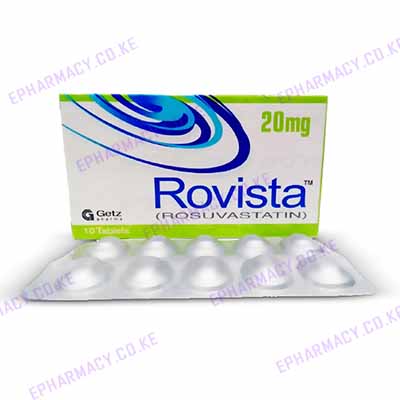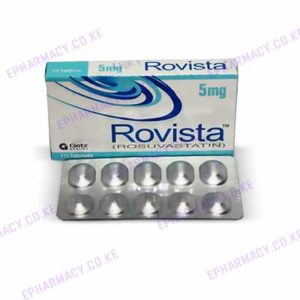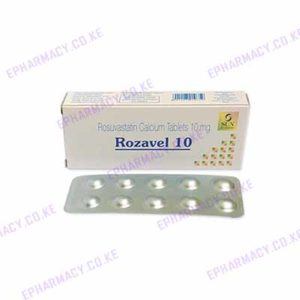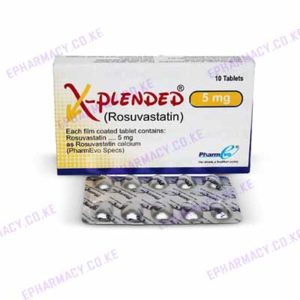Description
Uses and Administration of rosuvastatin in Kenya
Rosuvastatin, a hydroxymethylglutaryl coenzyme A (HMG-CoA) reductase inhibitor (a statin), is a lipid regulating drug with actions on plasma lipids similar to those of simvastatin. It is used to reduce LDL-cholesterol, apolipoprotein B, and triglycerides, and to increase HDL-cholesterol in the management of hyperlipidaemias in Kenyans, including primary hypercholesterolaemia (type IIa), mixed dyslipidaemia (type IIb), and hypertriglyceridaemia (type IV). It may also be used in patients with homozygous familial hypercholesterolaemia.
Rosuvastatin/rostat in Kenya is given by mouth as the calcium salt, although doses are expressed in terms of the base; 10.4 mg of rosuvastatin calcium is equivalent to 10 mg of base.
In the Kenya, the initial dose is 10 mg once daily, increased after 4 weeks, if necessary, to 20 mg once daily. A maximum dose of 40 mg once daily may be given in severe hypercholesterolemia, but should not be given to patients at high risk of myopathy, including those receiving fibrates; use with cyclosporine is contraindicated.
Still tried In Kenya , the usual initial dose is 10 mg once daily. However, a lower initial dose of 5 mg once daily is recommended for patients at risk of myopathy, whereas patients with marked hypercholesterolemia, such as those with homozygous familial hypercholesterolemia, may be started on 20 mg once daily. The dose should be adjusted after 2 to 4 weeks, to a maximum of 40 mg once daily. Patients receiving cyclosporine may be given a maximum of 5 mg once daily, and in those receiving gemfibrozil the maximum dose is 10 mg once daily.
The dose of rosuvastatin should be reduced in patients with renal impairment.
What are the possible Adverse Effects and side effects of rosuvastatin?
The commonest adverse effects of therapy with rosuvastatin in Kenya and other statins in general are gastrointestinal disturbances. Other adverse effects reported include
- headache
- skin rashes
- dizziness
- blurred vision
- insomnia
- dysgeusia
Reversible increases in serum-aminotransferase concentrations may occur and liver function should be assessed before treatment is initiated and then monitored periodically until one year after the last elevation in dose. Hepatitis and pancreatitis have been reported too in some patients in Kenya. Hypersensitivity reactions including anaphylaxis and angioedema have also occurred. Myopathy, characterised by myalgia and muscle weakness and associated with increased creatine phosphokinase concentrations, has been reported, especially in patients taking statins concurrently with ciclosporin, fibric acid derivatives, or nicotinic acid. Rarely, rhabdomyolysis with acute renal failure may develop.
Interactions of rosuvastatin with other medications
Rosuvastatin/crestor undergoes limited metabolism, principally by the cytochrome P450 isoenzyme CYP2C9. Increased rosuvastatin plasma concentrations have been reported with ciclosporin and, to a lesser extent, with gemfibrozil, and such combinations should be avoided. If they must be given together, lower doses of rosuvastatin should be used (i.e 5mg); in the Kenya, rosuvastatin is contraindicated with cyclosporine.
Precautions while taking rosuvastatin/rosugard in Kenya
Rosuvastatin/rovista should not be given to patients with active liver disease or unexplained persistently raised serum-aminotransferase concentrations. It should be avoided during pregnancy since there is a possibility that Rovista could interfere with fetal sterol synthesis; there have been a few reports of congenital abnormalities associated with statins in general (but see Pregnancy below). It should be discontinued if marked or persistent increases in serum-aminotransferase or creatine phosphokinase concentrations occur, or if myopathy is diagnosed.
Rosuvastatin should be used with caution in patients with severe renal impairment, with first dose being the minimum possible while on close monitoring at a health facility.
Children and rosuvastatin
Bile-acid binding resins such as colestyramine/questran have traditionally been used to treat heterozygous familial hyperlipidaemia in children and adolescents in Kenya. Limited information suggests that statins are effective at lowering total cholesterol and low-density lipoprotein (LDL)-cholesterol in children older than 10 years. However, there are concerns about the potential adverse effects of statins on growth and sexual development, because these patients require life-long therapy. A placebo-controlled study of lovastatin in 132 adolescent males reported significant reduction in LDL-cholesterol compared with placebo, but no significant differences between the groups in measures of growth and sexual maturation. However, patients were studied for one year only, and the authors acknowledge that further study is needed.
- Duplaga BA. Treatment of childhood hypercholesterolemia with HMG-CoA reductase inhibitors. Ann Pharmacother 1999; 33: 12247. PubMed
- Rifkind BM, et al. When should patients with heterozygous familial hypercholesterolemia be treated? JAMA 1999; 281: 1801. PubMed
- Stein EA, et al. Efficacy and safety of lovastatin in adolescent males with heterozygous familial hypercholesterolemia: a randomized controlled trial. JAMA 1999; 281: 13744. PubMed
Can I use Rosuvastatin/Rozavel if am Pregnant or expectant?.
All Statins inlcuding rosuvastatin/x-plended are generally contraindicated in pregnancy since there is a possibility that they might affect fetal sterol synthesis. Postmarketing surveillance identified 134 cases of unintentional exposure to lovastatin or simvastatin during pregnancy in which the outcome was known. Although there were 9 reports of congenital anomalies these consisted of a spectrum of unrelated malformations and the frequency did not exceed that expected in the general population. It was therefore considered that these drugs did not adversely affect outcome of pregnancy, but should not be used unless the benefits clearly do outweigh the risks.
Rosuvastatin can be bought online from ePharmacy Kenya






Reviews
There are no reviews yet.